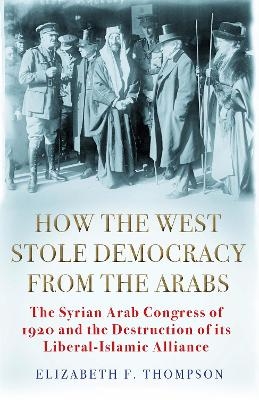
How the West Stole Democracy from the Arabs
Grove Press / Atlantic Monthly Press (Verlag)
978-1-61185-639-2 (ISBN)
- Titel ist leider vergriffen;
keine Neuauflage - Artikel merken
When Europe's Great War engulfed the Ottoman Empire, Arab nationalists rose in revolt against their Turkish rulers and allied with the British on the promise of an independent Arab state. In October 1918, the Arabs' military leader, Prince Faisal, victoriously entered Damascus and proclaimed a constitutional government in an independent Greater Syria.
Faisal won American support for self-determination at the Paris Peace Conference, but other Entente powers plotted to protect their colonial interests. Under threat of European occupation, the Syrian-Arab Congress declared independence on March 8, 1920 and crowned Faisal king of a 'civil representative monarchy.' Sheikh Rashid Rida, the most prominent Islamic thinker of the day, became Congress president and supervised the drafting of a constitution that established the world's first Arab democracy and guaranteed equal rights for all citizens, including non-Muslims.
But France and Britain refused to recognize the Damascus government and instead imposed a system of mandates on the pretext that Arabs were not yet ready for self-government. In July 1920, the French invaded and crushed the Syrian state. The fragile coalition of secular modernizers and Islamic reformers that had established democracy was destroyed, with profound consequences that reverberate still.
Using previously untapped primary sources, including contemporary newspaper accounts, reports of the Syrian-Arab Congress, and letters and diaries from participants, How the West Stole Democracy from the Arabs is a groundbreaking account of an extraordinary, brief moment of unity and hope - and of its destruction.
Elizabeth F. Thompson is a leading historian of the modern Middle East and Mohamed S. Farsi Chair of Islamic Peace at American University's School of International Service. She is the author of two previous books, Colonial Citizens: Republican Rights, Paternal Privilege and Gender in French Syria and Lebanon, winner of two national book prizes, and Justice Interrupted: The Struggle for Constitutional Government in the Middle East, published by Harvard University Press.
PART I: AN ARAB STATE IN SYRIA 1: Damascus: Enter the Prince 2: Aleppo: A Government and Justice for All 3: Cairo: A Sheikh Prays to an American President PART II: A CHILLY PEACE AT PARIS 4: Wooing Woodrow Wilson 5: The Covenant and the Colonial Color Line 6: A Sip of Champagne, with a Sour Aftertaste PART III: SYRIA'S DECLARATION OF INDEPENDENCE 7: The Syrian Congress and the American Commission 8: A Democratic Uprising in Damascus 9: Revolution at the Quai d'Orsay 10: The Prince, the Sheikh, and "The Day of Resurrection" 11: Wilsonism Colonized at San Remo PART IV: THE CONSTITUTION: A CIVIL WEAPON AGAINST COLONIZATION 12: The Sheikh versus the King: A Parliamentary Revolution 13: Women's Suffrage and the Limits of Islamic Law 14: A Democratic Constitution for Christians and Muslims PART V: SYRIA'S EXPULSION FROM THE CIVILIZED WORLD 15: Battle Plans for Syria 16: The French Ultimatum and Faisal's Dissolution of Congress 17: Maysalun: The Arab State's Last Stand 18: Wilson's Ghost in Geneva Epilogue: Parting of Ways-The Liberal, the Sheikh, and the King Appendix A: Members of Congress in March 1920 Appendix B: The Syrian Declaration of Independence, March 8, 1920 Appendix C: The Syrian Constitution of July 19, 1920
| Erscheinungsdatum | 07.05.2020 |
|---|---|
| Verlagsort | New York |
| Sprache | englisch |
| Maße | 170 x 240 mm |
| Gewicht | 930 g |
| Themenwelt | Geisteswissenschaften ► Geschichte ► Regional- / Ländergeschichte |
| Geisteswissenschaften ► Religion / Theologie | |
| Sozialwissenschaften ► Politik / Verwaltung ► Europäische / Internationale Politik | |
| Sozialwissenschaften ► Politik / Verwaltung ► Politische Systeme | |
| ISBN-10 | 1-61185-639-6 / 1611856396 |
| ISBN-13 | 978-1-61185-639-2 / 9781611856392 |
| Zustand | Neuware |
| Haben Sie eine Frage zum Produkt? |
aus dem Bereich


